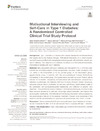Please use this identifier to cite or link to this item:
https://accedacris.ulpgc.es/jspui/handle/10553/77024
| Title: | Motivational Interviewing and Self-Care in Type 1 Diabetes: A Randomized Controlled Clinical Trial Study Protocol | Authors: | Alvarado Martel, Dácil Boronat Cortés, Mauro Alberiche Ruano, Maria Del Pino Algara González, María Andrea Ramallo Fariña, Yolanda Wägner, Anna Maria Claudia |
UNESCO Clasification: | 32 Ciencias médicas 320502 Endocrinología |
Keywords: | Adherence Health Related Quality Of Life Motivational Interviewing Randomised Controlled Trial Self-Care, et al |
Issue Date: | 2020 | Journal: | Frontiers in Endocrinology | Abstract: | Background: Type 1 diabetes is a disease with complex therapeutic recommendations that require day-to-day lifestyle changes. Motivational Interviewing is a communication tool that has proved effective in changing behaviors in people with addictions, obesity and type 2 diabetes. Our objective is to evaluate the effects of a Motivational Interviewing intervention in people with type 1 diabetes. Methods: Sixty-six patients with type 1 diabetes and hemoglobin A1c >= 8% have been included and randomly assigned (computer-generated sequence, sealed envelopes, ratio 1:1) either to the intervention or to the control group. In the intervention group, appointments every 4 months with the endocrinologist include Motivational Interviewing; in the control group, the appointments proceed as usual. Patients will be followed for 16 months. The primary outcome will be self-care behaviors, assessed by a validated questionnaire, the Diabetes Self-Care Inventory-Revised Version. Secondary outcomes include: HbA1c, motivation for self-care, self-efficacy, health-related quality of life, satisfaction with professional-patient relationship, and fulfillment of patients’ own objectives. The practitioners receive training in Motivational Interviewing in order to help them promote adherence to self-care, encourage patient motivation and improve the doctor-patient relationship. The Motivational Interviewing intervention will be evaluated by two psychologists, blinded to the assigned treatment, through video recordings of the sessions and the administration of a purpose-built questionnaire, the EVEM 2.0 scale. Discussion: There is evidence that MI can improve self-care in type 2 diabetes. In this study, we aim to evaluate the effect of MI on self-care and HbA1c in people with type 1 diabetes. Clinical Trial Registration: https://clinicaltrials.gov/ct2/show/NCT03906786, identifier NCT03906786. | URI: | https://accedacris.ulpgc.es/handle/10553/77024 | ISSN: | 1664-2392 | DOI: | 10.3389/fendo.2020.574312 | Source: | Frontiers in Endocrinology [EISSN 1664-2392], v. 11, (Diciembre 2020) |
| Appears in Collections: | Artículos |
SCOPUSTM
Citations
2
checked on Jun 8, 2025
WEB OF SCIENCETM
Citations
3
checked on Feb 22, 2026
Page view(s)
77
checked on Jan 11, 2026
Google ScholarTM
Check
Altmetric
Share
Export metadata
Items in accedaCRIS are protected by copyright, with all rights reserved, unless otherwise indicated.
